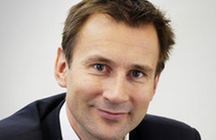Jeremy Hunt – 2013 Speech on Dementia
Below is the text of the speech made by Jeremy Hunt, the Secretary of State for Health, on 11th December 2013.
Ladies and gentlemen,
It is fantastic to see you all here today for the world’s first G8 Dementia Summit.
And it is right we should be here. As life expectancy goes up, our generation has a unique challenge: will those extra years at the end of our lives be ones we can look forward to with anticipation – or will they be ones we end up dreading?
One in three of us will get dementia. And if we don’t do better, for one in three those later years could be years of agony, heartbreak and despair – not just for those of us with the condition, but for our families, friends and loved ones too.
9 years ago Britain hosted the G8 in Gleneagles in Scotland. And we faced up to a different health challenge – HIV/AIDS. We did a brave and wonderful thing, declaring that anti-retroviral drugs should become available to all who needed them. Thanks to that, we have turned the global tide in the battle against AIDS.
Now we need to do it again.
We will bankrupt our healthcare systems if we don’t. Here in the UK the cost of dementia is £23 billion and globally it is approaching $600 billion. One in four people in UK hospitals have dementia, but the costs extend well beyond hospital care into social care, community care and the opportunity costs for carers.
But the real reason to do something about dementia is not financial.
The real reason is human. Everyone deserves to live their final years with dignity, respect and the support of loved-ones. That was the dream of universal healthcare coverage when we founded the NHS in the UK 65 years ago. Now with an ageing population we need to reinvent the model.
So let us focus on three areas of action for this summit.
Firstly to redouble our efforts to find a drug that can halt or reverse the brain decay caused by dementia. We thought we could never combat HIV. But just 9 years after the Gleneagles summit and with the involvement of some of Britain’s best universities, we are talking about a potential vaccine. We need that spirit of scientific endeavour for dementia and Alzheimer’s as well – and there is some fantastic work going on in our universities and research laboratories.
Secondly we need to improve diagnosis rates. In this country, despite our brilliant NHS, less than half of dementia patients get a diagnosis. Too many people – even some doctors – think there is no point. But with a diagnosis we can give out medicines that help some people; we can put in place support for families; we can encourage lifestyle change – all of which can mean people live at home happily and healthily for many years longer.
Thirdly let’s fight the stigma around dementia in society. When I was born in the 1960s, people didn’t like talking about cancer. The first step to improving treatment was to make it normal – we need to do that for dementia. So following the inspiring programme in Japan, we are trying to recruit one million dementia friends in England – people who know the basics and can be ambassadors for fighting stigma.
Right here we have the A team. Health ministers, science ministers, pharmaceutical companies, researchers, voluntary organisations, the OECD and the WHO. And we have some even more special guests: people who themselves have dementia and have had the courage to come today. Let us recognise them.
Let us today match their courage by daring to aim big. By showing future generations we were up to this challenge, ready to do what it takes to harness science, research and humanity to turn one of humanity’s greatest threats into one of its greatest achievements.
Thank you.

